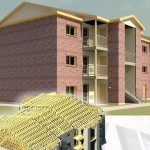 Construction administration is a crucial phase in any construction project, ensuring that the project progresses smoothly, adheres to the specified standards, and meets the client’s expectations. Effective construction administration involves a range of responsibilities and best practices that, when followed diligently, can significantly enhance the chances of project success. This blog will explore the key responsibilities and best practices of construction administration, helping clients understand its vital role in project execution.
Construction administration is a crucial phase in any construction project, ensuring that the project progresses smoothly, adheres to the specified standards, and meets the client’s expectations. Effective construction administration involves a range of responsibilities and best practices that, when followed diligently, can significantly enhance the chances of project success. This blog will explore the key responsibilities and best practices of construction administration, helping clients understand its vital role in project execution.
Key responsibilities in construction administration
1. Project oversight and coordination
One of the primary responsibilities of construction administration is overseeing the project to ensure it is progressing according to plan. This involves regular site visits, coordinating with contractors, and ensuring that all activities are aligned with the project timeline. Effective oversight helps identify potential issues early, allowing for timely intervention and correction.
2. Quality control
Quality control is essential in construction administration. This involves monitoring the construction process to ensure that all work meets the required standards and specifications. Regular inspections and quality checks are conducted to verify that materials, workmanship, and construction practices comply with the project’s design and contract documents.
3. Contract administration
Managing contracts is a critical aspect of construction administration. This includes ensuring that both the contractor and the client meet all contractual obligations. It involves reviewing and approving change orders, managing payments, and handling any disputes that may arise. Effective contract administration helps maintain clear communication and accountability throughout the project.
4. Document management
Construction projects generate a significant amount of documentation, including drawings, specifications, contracts, and reports. Effective document management ensures that all project documents are organized, up-to-date, and easily accessible. This helps in maintaining transparency and facilitating communication among all stakeholders.
5. Safety management
Ensuring the safety of all workers and visitors on the construction site is a top priority. Construction administration involves implementing and monitoring safety protocols to prevent accidents and injuries. Regular safety audits and training sessions are conducted to ensure compliance with safety regulations and standards.
Best practices for successful construction administration
1. Clear communication
Effective communication is the cornerstone of successful construction administration. Clear and open communication channels should be established among all project stakeholders, including clients, contractors, architects, and engineers. Regular meetings, progress reports, and updates help keep everyone informed and aligned with the project goals.
2. Detailed planning
Thorough planning is essential for managing a construction project successfully. This includes developing a detailed project schedule, budget, and resource allocation plan. A well-defined plan helps in tracking progress, identifying potential bottlenecks, and making informed decisions to keep the project on track.
3. Proactive problem-solving
Challenges and unexpected issues are inevitable in any construction project. Proactive problem-solving involves identifying potential problems early and addressing them promptly. This requires a flexible and adaptive approach, where solutions are implemented quickly to minimize disruptions and delays.
4. Regular inspections and audits
Conducting regular inspections and audits is crucial for ensuring quality and compliance. These inspections should cover all aspects of the construction process, including materials, workmanship, safety practices, and adherence to design specifications. Regular audits help in identifying any deviations from the plan and taking corrective actions promptly.
5. Stakeholder engagement
Engaging all stakeholders throughout the project is vital for its success. This includes keeping the client informed about progress, seeking their input and feedback, and addressing any concerns they may have. Engaging stakeholders fosters a collaborative environment and ensures that the project meets their expectations.
6. Use of technology
Leveraging technology can greatly enhance construction administration. Tools like Building Information Modeling (BIM), project management software, and mobile applications facilitate better planning, communication, and documentation. These technologies provide real-time insights into the project, enabling more efficient management and decision-making.
7. Effective change management
Changes are a common occurrence in construction projects. Effective change management involves assessing the impact of changes on the project’s scope, schedule, and budget. It requires clear documentation of change orders, approval processes, and communication with all stakeholders to ensure that changes are managed efficiently and transparently.
8. Focus on sustainability
Incorporating sustainability practices into construction projects is becoming increasingly important. This involves using eco-friendly materials, implementing energy-efficient systems, and minimizing waste. Focusing on sustainability not only benefits the environment but also enhances the long-term value and performance of the project.
Ensuring project success through effective construction administration
Effective construction administration is essential for the successful execution of any construction project. By adhering to best practices such as clear communication, detailed planning, proactive problem-solving, regular inspections, stakeholder engagement, use of technology, effective change management, and a focus on sustainability, construction administrators can ensure that projects are completed on time, within budget, and to the highest quality standards.
At McNeil Engineering, we are committed to delivering timely, responsive, and economical design solutions. Our comprehensive design services include civil engineering, structural engineering, land surveying, high-definition scanning (HDS), landscape architecture, and consulting services. We understand the critical role of construction administration in project success and strive to implement best practices to ensure that our clients’ projects meet and exceed their expectations.
If you are looking for a reliable partner to manage your construction projects, look no further than McNeil Engineering. Visit McNeil Engineering to learn more about our services and how we can help you achieve your project goals with precision and efficiency. Let us help you navigate the complexities of your project and deliver results that exceed your expectations.








